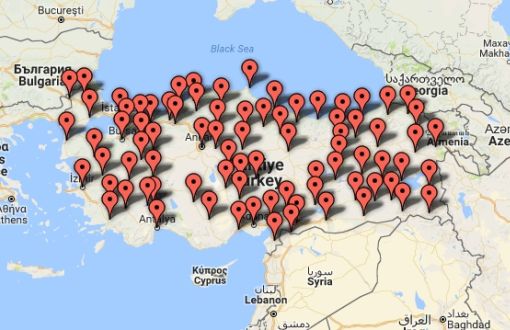On 18th February 2017 ECREA issued a public statement, expressing deep concerns about the continuing suppression of academic freedom and mounting pressures on the autonomy of universities in Turkey.
The report below presents an update about the current situation regarding academic freedom in Turkey.
An intensified crackdown on press and academic freedoms in Turkey
One year after the coup attempt in Turkey, the harsh crackdown on academic freedom and freedom of speech continues with the dismissal, detention and arrest of thousands of academics and journalists, intensifying the climate of fear in the country.
The coup attempt in July 2016 that was followed by the declaration of a state of emergency, gave the AKP government the authority to issue statutory decrees without any judicial control. These decree laws have been used to carry out a massive crackdown on academics, state officials and journalists since last year.
So far, the government has issued 8 statutory decrees which caused the dismissal of 5,717 academics since September 2016, with only 140 of them being allowed to return to their duties (Turkish Official Gazette; Öztürk, 2017; Bianet, 2017). At least 380 were the signatories of the “Peace Petition” in 2016, which criticized the heavy military operations in the predominantly Kurdish-populated southeastern Turkey (Bianet, 2017). In its attempt to eliminate dissident voices in academia, the Turkish government has kept the proceedings of investigations nontransparent and unclear, benefiting from the state of emergency.
Academics were also affected by other decrees that led to the closure of universities and staff reductions. Taking them into account, BBC Turkish reported that more than 8400 academics lost their jobs because of such reasons and all these processes adversely affected 65,000 students (Öztürk, 2017).
Most of the academics who are fired, detained or arrested are primarily accused of making terrorist propaganda and of having links with Fethullah Gülen, the U.S.-based Islamic preacher, whom the Turkish government accused of being the mastermind of the failed coup. Among these, particularly concerning is the prosecution of signatories of the Academics for Peace petition and of academics and members of the university administration who either supported or refused to take action against the signatories. These academics are now individually taken to seven courts in Istanbul starting December 5, 2017 under charges of terrorism with a minimum prison sentence of 7 years (Bianet 2017b). The political pressures on academics are so severe that scholarly publications are now published anonymously for fear of persecution (Anonymous 2017).
Meanwhile, the purge hit journalists and media outlets, as well. A lack of official figures has led to varying numbers being given by different groups, but an estimated 200 journalists are currently in jail, with some groups putting the number at 300 (Turkey Purge). According to Platform for Independent Journalism (P24), 187 media outlets have been shut down since the failed coup last year. Also, more than 2,700 media professionals lost their jobs (Freedom House, 2017). Declining 4 places this year, Turkey ranks 155th out of 180 countries in RSF’s 2017 World Press Freedom Index, having the title of “the world’s biggest prison for professional journalists.”

Image 1: Map of Academic Dismissals in Turkey “As the new academic year has begun, 5,717 academics from 117 universities in 81 cities have been discharged, only 140 of them have been reinstated to their jobs.” by Beyza Kural (BIA News Desk) on 19 September 2017. Available at: http://m.bianet.org/english/human-rights/189957-academic-discharges-on-map-as-new-academic-year-begins
Similar to academics, journalists are primarily convicted by the use of anti-terror laws and they are accused of being a member of an armed organization, revealing leaked intelligence, and insulting state leaders.
In addition to dismissals and arrests, humiliating practices against academics and journalists during detention, as well as travel bans and restrictions on scholarly work and journalistic practices, are an alarming attack on academic freedoms and freedom of expression in the country. All these actions against Turkish academics and media professionals by the Turkish government do not only undermine fundamental human rights, but they also harm the building of democratic societies and intellectual progress.
Further scrutiny into the working conditions of academics in Turkey is invited from academia around the world. Left unchecked such mistreatment of academics risks nurturing an atmosphere of fear and self-censorship, which is the end of free thought and production of scientific knowledge. Recently scholars like Judith Butler, Nilufer Göle and Umut Özkirimli took note of the brutal and unfair treatment of academics in Turkey (Butler 2017; Göle 2017; Özkirimli 2017).
Sources:
120 Akademisyen, 52 İdari Personele İhraç. (2017, August 25). Bianet. Retrieved 26 August 2017, https://bianet.org/bianet/toplum/189389-120- akademisyen-52- idari-personele-ihrac
Hearings of 10 Academics Adjourned to April 12 (2017, December 5) Bianet. Retrieved 5 December 2017, https://bianet.org/english/human-rights/192145-hearings-of-10-academics-adjourned-to-april-12
Anonymous (2017). State vs. Academy in Turkey: Academy Under Surveillance. Surveillance & Society, 15(3/4), 550-556.
Butler, J. (2017). Academic Freedom and the Critical Task of the University. Globalizations, 14(6), 857-861.
Freedom House (2017), Turkey, Retrieved 17 May 2017, https://freedomhouse.org/report/freedom-press/2017/turkey
Göle, N. (2017). Undesirable Public Intellectuals. Globalizations, 14(6), 877-883.
Journalism in Jail. (n.d.). Turkey Purge. Retrieved 26 August 2017, https://turkeypurge.com/journalism-in- jail
Reporters Without Borders (2017). Journalists in new wave of arrests in Turkey. Retrieved 26 August 2017, https://rsf.org/en/news/journalists-new- wave-arrests- turkey
P24 (2017). Journalists in State of Emergency - 87. Retrieved 26 August 2017, http://platform24.org/en/articles/516/journalists-in-state-of-emergency---87
P24 (2017). Olağanüstü Hâl'de Gazeteciler - 101. Retrieved 26 August 2017, http://platform24.org/medya-izleme/2372/olaganustu-h-l-de-gazeteciler---101
Özkirimli, U. (2017). How to Liquidate a People? Academic Freedom in Turkey and Beyond. Globalizations, 14(6), 851-856.
Öztürk, F. (2017). İnteraktif: 15 Temmuz darbe girişimi sonrası ilan edilen OHAL üniversiteleri nasıl etkiledi?. BBC Türkçe. Retrieved 26 August 2017, http://www.bbc.com/turkce/haberler-turkiye- 40567898